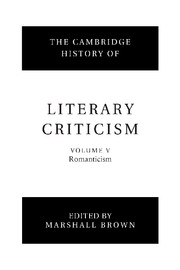Book contents
- Frontmatter
- Introduction
- 1 Classical standards in the period
- 2 Innovation and modernity
- 3 The French Revolution
- 4 Transcendental philosophy and Romantic criticism
- 5 Nature
- 6 Scientific models
- 7 Religion and literature
- 8 Language theory and the art of understanding
- 9 The transformation of rhetoric
- 10 Romantic irony
- 11 Theories of genre
- 12 Theory of the novel
- 13 The impact of Shakespeare
- 14 The vocation of criticism and the crisis of the republic of letters
- 15 Women, gender and literary criticism
- 16 Literary history and historicism
- 17 Literature and the other arts
- Bibliography
- Index
- References
2 - Innovation and modernity
Published online by Cambridge University Press: 28 March 2008
- Frontmatter
- Introduction
- 1 Classical standards in the period
- 2 Innovation and modernity
- 3 The French Revolution
- 4 Transcendental philosophy and Romantic criticism
- 5 Nature
- 6 Scientific models
- 7 Religion and literature
- 8 Language theory and the art of understanding
- 9 The transformation of rhetoric
- 10 Romantic irony
- 11 Theories of genre
- 12 Theory of the novel
- 13 The impact of Shakespeare
- 14 The vocation of criticism and the crisis of the republic of letters
- 15 Women, gender and literary criticism
- 16 Literary history and historicism
- 17 Literature and the other arts
- Bibliography
- Index
- References
Summary
In this essay I would like to discuss the inaugural and modern dimensions of literary and artistic Romantic criticism in Europe. It is useful to begin, however, with a few general observations on the Enlightenment, and, first of all, with the fact that in this period reason was engaged in a critique of the world and of itself, thereby transforming traditional rationalism and its atemporal, geometric qualities. Modernity has its origins in this new orientation of reason and criticism, that is to say, in the emergence and diffusion of critical reason in every sphere.
Criticism becomes, therefore, the distinctive trait of modernity. Modernity begins as a critique, expressed through the principles of reason, philosophy, religion, morality, law, history, economics and politics. From this same critique arise the fundamental concepts and cardinal ideas of modernity, above all, progress, evolution, revolution, liberty, democracy, science and technology.
Criticism manifested itself in numerous ways and domains, first and foremost in the critique of Reason itself, in reason's renunciation of the grandiose constructs which identified it with the good, with being and with truth. Reason likewise ceased to be the home of the idea and became instead a journey, an investigative methodology based on scientific and empirical principles. Criticism also expressed itself as the critique of metaphysics and of its truths impervious to change. But it likewise became the critique of the certainties of traditional values, institutions and beliefs. With Rousseau, Laclos and Sade, to mention a few emblematic names, criticism expressed itself as the critique of habits and customs.
- Type
- Chapter
- Information
- The Cambridge History of Literary Criticism , pp. 29 - 48Publisher: Cambridge University PressPrint publication year: 2000
References
- 1
- Cited by

